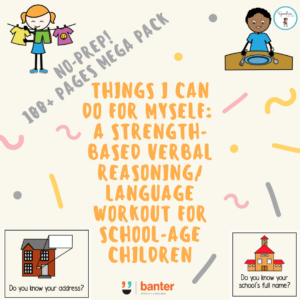(L421) Things I Can Do For Myself Language Workout Mega Pack
$12.00 including GST
In this 102-page No-Prep Mega Pack, we have embraced the theme of ‘Things I can do for myself’.
Specific goals you can target with this resource
- Goal 1: Why do things happen? Auditory bombardment of complex sentences containing the subordinating conjunction, ‘because’. Cause/effect relationships (page 5-11)
- Goal 2: Sequencing Objects (page 12-19)
- Goal 3: Processing and producing negative questions (page 20-34)
- Goal 4: Generating a logical explanation for a problem. Generating a possible solution for the problem (page 35-47)
- Goal 5: Logical predictions and possible solutions based on basic knowledge of the world (page 48-62)
- Goal 6: Divergent Thinking (page 63-74)
- Goal 7: To draw inferences from facts given and from general knowledge (page 75-81)
- Goal 8: Explaining tasks and abilities using sequenced procedures (page 82-95)
- Goal 9: Setting a plan for things the student can do for themselves (page 96-101).
Description
Things I can do for myself: A strength-based verbal reasoning/language workout, including tasks designed to stimulate the understanding of cause/effect relationships, problems and solutions, predictive thinking, sequencing skills, negative questions, divergent thinking, basic knowledge and life skills, and to improve independence and self-confidence from knowing how to do basic things in familiar places with supportive people.
We all want kids to be happy, independent, well-behaved and well-liked. But, sometimes – despite our best hopes – they struggle. And few things in life are as stressful as seeing a child suffer as they withdraw from their friends and families, avoid activities, and become reliant on others to advocate for their needs.
Increasing happiness by helping others
Back in 2012, Kristin Loyous and colleagues reviewed peer-reviewed research on kids’ happiness and observed that students who are well-liked also tend to be helpful, cooperative and emotionally well-adjusted. They also found that students who performed acts of kindness for others experienced greater increases in their acceptance by their peers.
This research suggests that, to help kids to be happy and well-adjusted, we should seek to increase the number of times per week kids are expected to engage in helpful, pro-social activities, including chores for others’ benefit. One simple way to do this is to establish expectations for kids to:
- do small acts of good for others three times a week (e.g. giving mum a hug, sharing a toy with a sibling without squabbling, or completing chores without being asked); and
- get out of the house, and do more social activities three times a week (e.g. visiting grandparents, playing team sports, or going for a long walk or bike ride as a family or with others).
Increasing independence by improving language and problem solving skills to help others
Many kids – including many children with language and other learning disorders – learn to be passive and helpless. When kids struggle, it’s natural for family members and others to rally round to help. But too much help – anticipating the child’s needs and doing everything for them – can reduce children’s opportunities to communicate independently – to make requests, solve problems for themselves, put things in order, generate ideas, and improve independence and self-confidence by knowing how to do things for themselves.
In this 102-page No-Prep Mega Pack, we have embraced the theme of ‘Things I can do for myself’.
~~~~~~~~~~~~~~~~~~~~~~~~~~~~~~~~~~~~~~~~~~~~~~~~~~~~~~~~~~~~
Specific goals you can target with this resource
- Goal 1: Why do things happen? Auditory bombardment of complex sentences containing the subordinating conjunction, ‘because’. Cause/effect relationships (page 5-11)
- Goal 2: Sequencing Objects (page 12-19)
- Goal 3: Processing and producing negative questions (page 20-34)
- Goal 4: Generating a logical explanation for a problem. Generating a possible solution for the problem (page 35-47)
- Goal 5: Logical predictions and possible solutions based on basic knowledge of the world (page 48-62)
- Goal 6: Divergent Thinking (page 63-74)
- Goal 7: To draw inferences from facts given and from general knowledge (page 75-81)
- Goal 8: Explaining tasks and abilities using sequenced procedures (page 82-95)
- Goal 9: Setting a plan for things the student can do for themselves (page 96-101).
~~~~~~~~~~~~~~~~~~~~~~~~~~~~~~~~~~~~~~~~~~~~~~~~~~~~~~~~~~~~

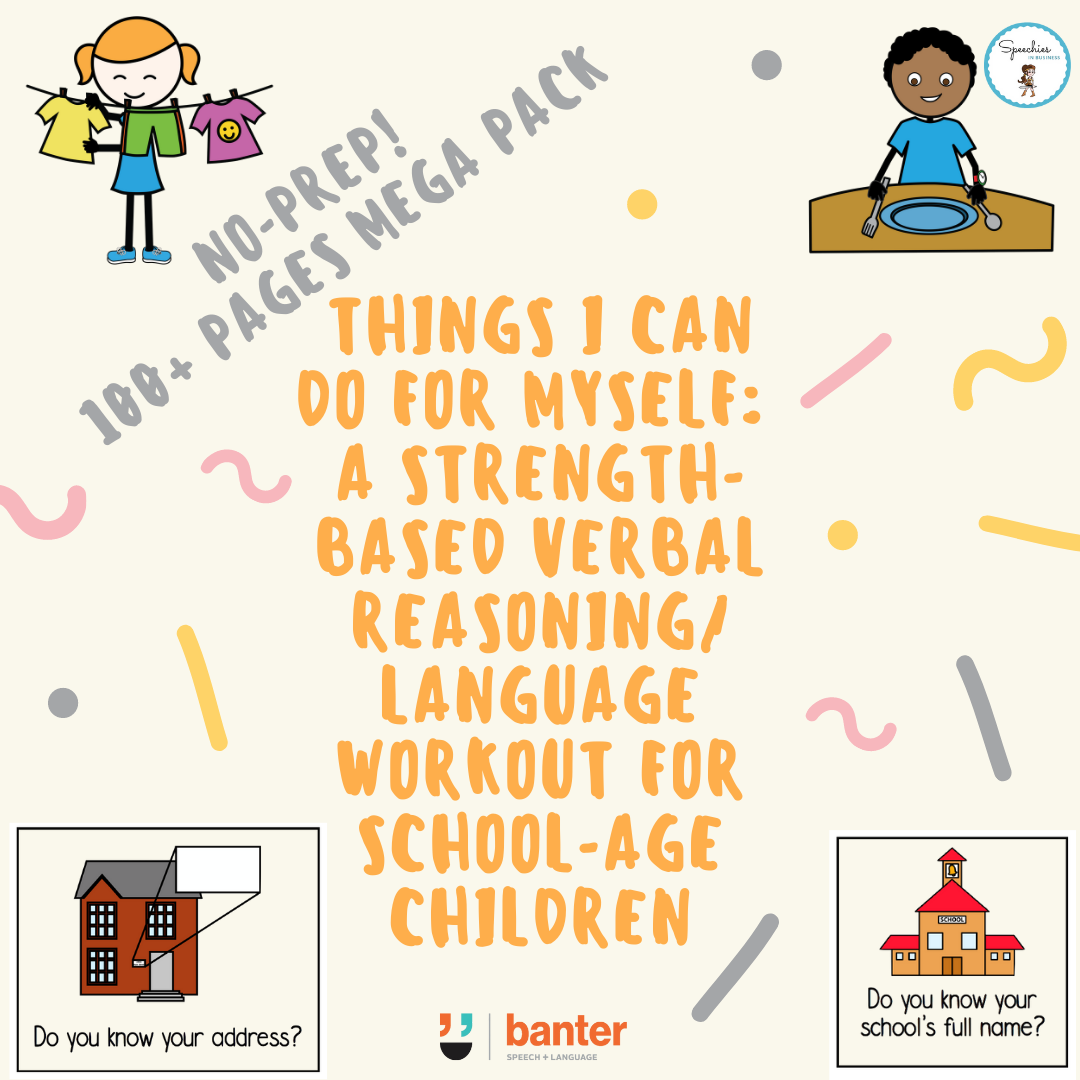




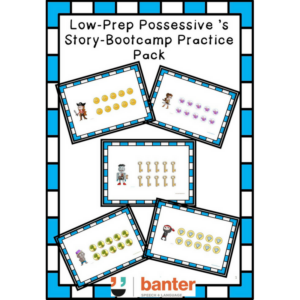
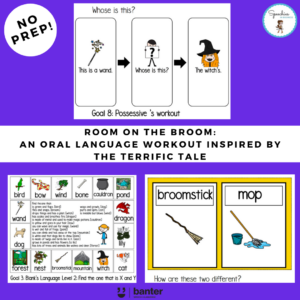
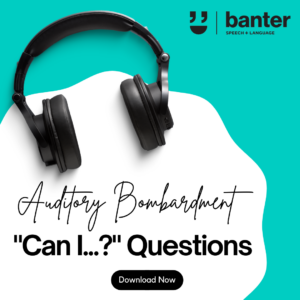
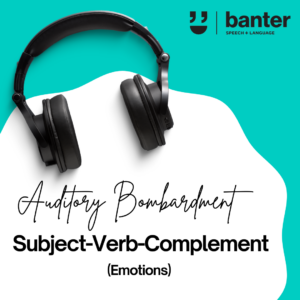
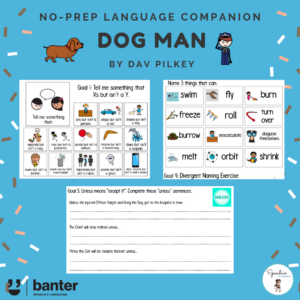 (L323) Book: Dog Man by Dav Pilkey: Language Companion
(L323) Book: Dog Man by Dav Pilkey: Language Companion 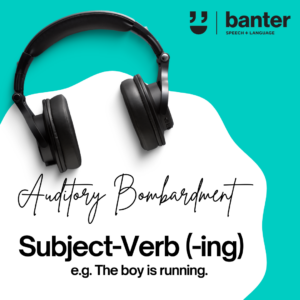 (L111) Subject-Verb (-ing) (Auditory bombardment)
(L111) Subject-Verb (-ing) (Auditory bombardment) 